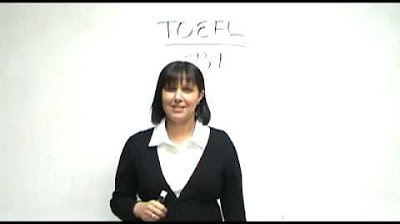8 Great Idioms for the TOEFL | Natural English for TOEFL Speaking & Writing
Summary
TLDRIn this informative video by Prep Scholar, Rosanna explains the concept of idioms, highlighting their importance in mastering English, particularly for the TOEFL exam. She presents eight useful idioms, such as "cut corners" and "couch potato," with clear definitions and examples to illustrate their meanings. The video emphasizes how using idioms can enhance responses in speaking and writing sections of the TOEFL, helping students sound more confident and natural. Viewers are encouraged to learn and incorporate these idioms into their language practice to improve their overall English proficiency.
Takeaways
- 😀 An idiom is a phrase whose meaning differs from its literal definition.
- 😀 Example of an idiom: 'crying wolf' means asking for help when it's not needed.
- 😀 Knowing idioms enhances comprehension and helps non-native speakers sound more natural.
- 😀 Idioms can appear in TOEFL reading, listening, speaking, and writing sections.
- 😀 'Cut corners' means to do something poorly to save time or money.
- 😀 'Hang in there' encourages patience during difficult situations.
- 😀 'On the fence' refers to someone who hasn't decided between two options.
- 😀 'Test the waters' means to try something out without full commitment.
- 😀 'Make a long story short' is used to summarize a story briefly.
- 😀 'Piece of cake' means something is very easy to do.
- 😀 'Couch potato' describes someone who is lazy and prefers watching TV.
- 😀 A free master guide to TOEFL vocabulary is available to help students prepare.
Q & A
What is an idiom?
-An idiom is a word or phrase that has a different meaning than its literal definition.
What does the idiom 'crying wolf' mean?
-'Crying wolf' means asking for help when you don't actually need it.
Why is knowing idioms important for the TOEFL?
-Knowing common idioms can improve your understanding of English and help your answers sound more confident and natural on the TOEFL.
What does the idiom 'cut corners' imply?
-'Cut corners' implies doing something poorly or cheaply, often to save time or money.
How can 'hang in there' be used in a sentence?
-You can use it to encourage someone to be patient, such as: 'If you hang in there, you'll eventually understand the material.'
What does the idiom 'on the fence' refer to?
-'On the fence' refers to someone who hasn't decided between two options.
What is the meaning of 'test the waters'?
-'Test the waters' means to try something out without fully committing to it.
How is 'make a long story short' used?
-It is used to summarize the main point after telling a longer story.
What does 'piece of cake' signify?
-'Piece of cake' signifies that something is very easy to do.
What does the term 'couch potato' describe?
-'Couch potato' describes someone who is lazy, often spending a lot of time sitting on the couch watching TV.
Outlines

This section is available to paid users only. Please upgrade to access this part.
Upgrade NowMindmap

This section is available to paid users only. Please upgrade to access this part.
Upgrade NowKeywords

This section is available to paid users only. Please upgrade to access this part.
Upgrade NowHighlights

This section is available to paid users only. Please upgrade to access this part.
Upgrade NowTranscripts

This section is available to paid users only. Please upgrade to access this part.
Upgrade NowBrowse More Related Video

Score 9.0 on IELTS Speaking with these 10 Must-Know Idioms.

How to prepare for TOEFL in 2 weeks

TOEFL Basics - Introduction to TOEFL iBT

Writing & Punctuation: How to use a COMMA correctly in a complex sentence

Latihan Jawab 10 Soal TOEFL Listening Part A dengan CERMAT

Fix these COMMON mistakes BEFORE you take your TOEFL Exam! Typical Problems Students Face on TOEFL
5.0 / 5 (0 votes)